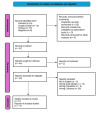Impact of Beta-Blocker Therapy on Pregnant Women With Long QT Syndrome: A Systematic Review
- PMID: 39553006
- PMCID: PMC11568869
- DOI: 10.7759/cureus.71678
Impact of Beta-Blocker Therapy on Pregnant Women With Long QT Syndrome: A Systematic Review
Abstract
Long QT syndrome (LQTS) presents significant challenges for pregnant women due to the elevated risk of arrhythmic events. Beta-blocker therapy is a cornerstone of treatment in managing LQTS, but its use during pregnancy introduces potential fetal risks. This systematic review synthesizes the evidence on the efficacy and safety of beta-blocker therapy in pregnant women with LQTS. A systematic review was conducted to assess studies on beta-blocker use in pregnant women diagnosed with LQTS. We reviewed observational studies and case reports to evaluate maternal cardiac outcomes, fetal safety, and the need for postpartum management. Studies were selected based on inclusion criteria focused on LQTS, beta-blocker therapy during pregnancy, and associated maternal and fetal outcomes. Our review showed that beta-blocker therapy significantly reduced arrhythmic events in pregnant women with LQTS, particularly in symptomatic carriers. Multiple studies demonstrated that the continuation of beta-blocker therapy throughout pregnancy and the postpartum period minimized maternal cardiac risks. However, beta-blocker use was associated with fetal risks such as intrauterine growth restriction (IUGR), lower birth weight, and, in some cases, bradycardia. Atenolol, in particular, was linked to significant fetal growth restrictions, while other beta-blockers, such as propranolol and metoprolol, showed more variable effects on fetal outcomes. Despite these concerns, some studies reported favorable postnatal growth recovery in infants exposed to beta-blockers in utero. Beta-blocker use must be carefully managed due to potential fetal risks. Regular monitoring, individualized treatment plans, and appropriate selection of beta-blocker type are essential to optimizing both maternal and fetal outcomes. Further research is necessary to refine treatment protocols and reduce fetal risks associated with beta-blocker therapy during pregnancy.
Keywords: arrhythmia; beta-blockers; intrauterine growth restriction; long qt syndrome; pregnancy.
Copyright © 2024, Alrabadi et al.
Conflict of interest statement
Conflicts of interest: In compliance with the ICMJE uniform disclosure form, all authors declare the following: Payment/services info: All authors have declared that no financial support was received from any organization for the submitted work. Financial relationships: All authors have declared that they have no financial relationships at present or within the previous three years with any organizations that might have an interest in the submitted work. Other relationships: All authors have declared that there are no other relationships or activities that could appear to have influenced the submitted work.
Figures
References
-
- Long QT syndrome in adults. Sauer AJ, Moss AJ, McNitt S, et al. J Am Coll Cardiol. 2007;49:329–337. - PubMed
-
- Identification of a common genetic substrate underlying postpartum cardiac events in congenital long QT syndrome. Khositseth A, Tester DJ, Will ML, Bell CM, Ackerman MJ. Heart Rhythm. 2004;1:60–64. - PubMed
-
- Long QT syndrome and pregnancy. Seth R, Moss AJ, McNitt S, et al. J Am Coll Cardiol. 2007;49:1092–1098. - PubMed
Publication types
LinkOut - more resources
Full Text Sources

